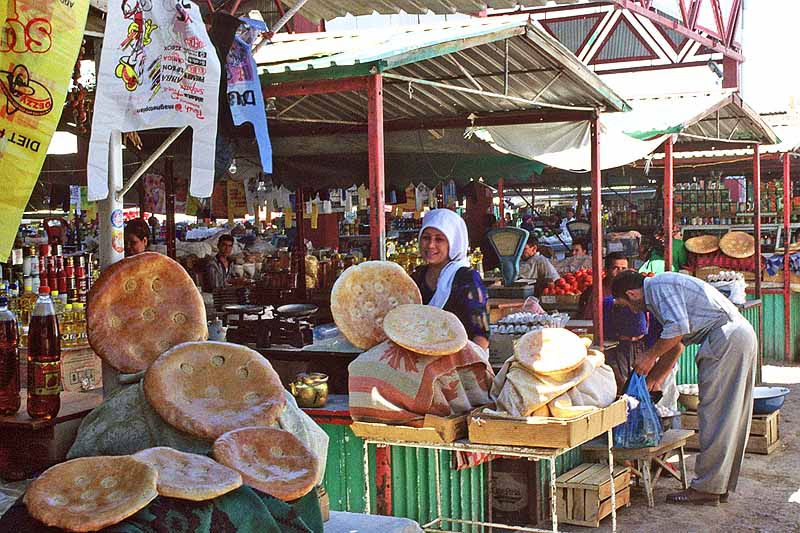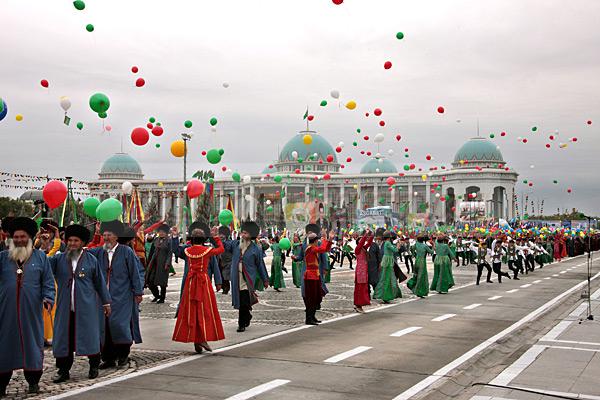Ashkhabad continues working on a new image of Turkmenistan as a country of democratic reforms. President Gurbanguly Berdimuhamedov announced upcoming changes. Amendments will be made to the Constitution of the country. They will touch on the social security of citizens, stability, and separation of powers, youth rights, and political variety. According to experts, this will be noted in the West. First of all, the OSCE Office for Democratic Institutions and Human Rights will hold another session in Warsaw next week. A report on the situation in Turkmenistan will be presented there. It was developed by international human rights activists who earlier recommended that Ashkhabad work on certain aspects. Secondly, in late September, Argadag (the title of President Berdimuhamedov) is going to visit the U.S. and speak at the 70th session of the UN General Assembly.
When Berdimuhamedov came to power in 2007 he said that all the laws adopted by Turkmenbashi (the first president of Turkmenistan, Saparmurad Niyazov) should have been reconsidered by the parliament. A new Constitution of the country was adopted in September 2008. According to it, the supreme representative and legislative body of power – the Khalk-Maslakhaty – was eliminated. The principle of a multi-party system was implemented. The second constitutional reform started in May 2014, when Berdimuhamedov signed an act on the establishment of the Constitutional Commission for Improvement of the Constitution of Turkmenistan. Probably, this time a norm which requires a prolongation of a presidential term from 5 to 7 years will be included in the Constitution.

Experts believe that Berdimuhamedov's course toward the Europeanization of the country is an attempt to build an image of a democratic leader and approach the West for gaining investment in the energy sphere.
The current amendments will touch on several spheres, according to the head of Turkmenistan. For example, Berdimuhamedov stands for including “the proviso on security of the national sovereignty of Turkmenistan, which reflects the striving of the nation to live in peace, unity and political stability” to the first part of the Constitution.
The President also informed the Council of the Elders about “absolutely new” constitutional norms. The first norm states that “the main goal of the governmental bodies is the protection and support of a person and serving him or her,” the second one states that “Turkmenistan is a state which guarantees social security to every person.”
According to the President, a proviso on the division of state power into three independent branches (legislative, executive and judicial powers) is also new in the Constitution. He suggests including articles on the President, the parliament, the Cabinet of Ministers, and the Supreme Court of Turkmenistan to corresponding parts of the Constitution.

The new Constitution will also have a new part on the economic and monetary system, the President says. Moreover, there will be provisos on governmental encouragement and support of business; on the national policy on realization and support of rights and freedoms of youth; on environmental policy; on the rights of every person for a favorable living environment, reliable information about it, compensation of harm to a person’s health and his or her property as a result of violation of the environmental laws or natural disasters.
Berdimuhamedov wants to include a new proviso on political variety and the creation of the necessary conditions for the development of civic society by the state to the Constitution. Along with the pro-presidential Democratic Party, two other political parties have been created recently in Turkmenistan – the Party of Fellow-Thinkers and Entrepreneurs of Turkmenistan, and the Agrarian Party of Turkmenistan. “These parties have no political influence in society. Their creation is connected with political rhetoric, an attempt to find the West’s goodwill,” Shokhrat Kadyrov, PhD (History), the senior scientist of the Oriental Studies Institute of the RAS, told Vestnik Kavkaza. He explains the constitutional reform is due to the end of the era of “the parasitical economy.” Prices for oil and gas fell to a level which couldn’t provide the population’s welfare. “It is believed that Turkmenistan is a gas power; but few people know that the main revenues to the country’s budget are coming from oil exporte, not gas exports. Speaking about gas, I should say that a growth in gas revenues will be connected not with the construction of new pipelines, which cost $5 billion or more, but with a shift to production of liquid gas; as in 2020 experts expect a radical shift to its use in the world,” the expert says. “That’s why Berdimuhamedov is worried about the budget and wants to eliminate benefits on free quotas on public utilities.” Members of the Council of the Elders supported the idea of eliminating the norm of providing the population with water, electricity and gas for free. Since the era of Turkmenbashi, these benefits of Turkmen citizens have been thought to be the greatest achievement of independence.
“Of course such a decision will have certain consequences, and the second president is trying to present himself as a consistent democrat to the West. He speaks about a division of powers, political variety, the rights of youth, i.e. 70% of the country’s population. Berdimuhamedov is trying to avoid possible criticism for undemocratic decisions, if some protests begin in the country, which will be cruelly suppressed without any doubts,” Kadyrov said.







